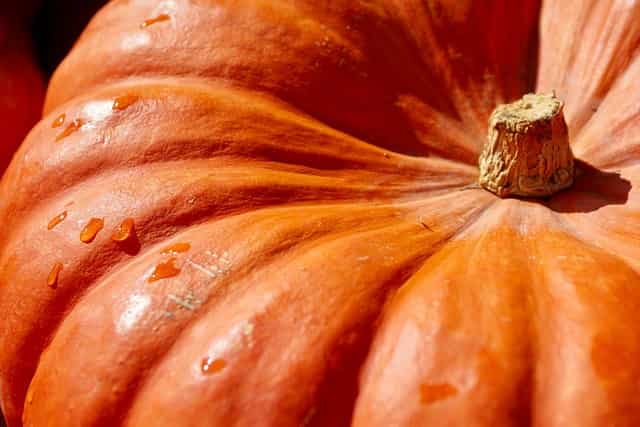Pumpkin is a type of winter squash that belongs to the Cucurbitaceae family. They are one of the oldest domesticated plants. This plant’s fleshy shell, seeds, leaves, and flowers are edible. When the pumpkin is ripe it can be boiled, steamed, or roasted. At the same time, pumpkins that are immature may be eaten as summer squash. White, green, orange, deep yellow, red, and blue pumpkin colors exist.
Pumpkin flowers are used to garnish dishes or dredged in a batter and then fried in oil. These vegetable seeds are known as pepitas. The seeds are edible, nutrient-rich, and are a good source of protein, magnesium, copper, and zinc. In comparison, pumpkin seed oil has fatty acids like oleic acid and alpha-linolenic acid.
Pumpkin varieties
There are many varieties of pumpkins such as:
- Jack-o’-lantern: a large variety that’s used for carving.
- Pie pumpkins: a smaller, sweeter variety.
- Miniature: used for decoration but also edible.
- White: used for decoration but can be cooked.
- Giant: mostly grown for contests; technically edible but less flavorful than smaller pumpkins.
Pumpkin nutrition value
240 grams of canned pumpkin provides the following nutrition values:
- Calories: 135
- Protein: 3 grams
- Fat: 7 grams
- Carbs: 18 grams
- Fiber: 6 grams
- Vitamin A: 205%
- Vitamin K: 35%
- Copper: 26%
- Vitamin E: 21%
- Iron: 17%
- Magnesium: 12%
- Riboflavin: 10%
- Vitamin B6: 10%
- Vitamin C: 10%
- Potassium: 9%
Health Benefits of Pumpkin
1. Low in Calories
Pumpkin is a vegetable that is very low in calories. According to studies 100 grams of pumpkin provide only 26 calories. However, many dieticians recommend pumpkin in their weight reduction programs.
2. Anti-ageing Benefits
Pumpkin contains vitamin C which is a powerful antioxidant. It also contains beta-carotene which helps to reverse UV damage and improve skin texture. This vitamin protects the skin from radical damage which is responsible for causing wrinkles and even skin cancer. It helps to promote collagen production, thus improving your skin tone and elasticity.
3. Promotes Hair Growth
Pumpkin is loaded with minerals such as alpha-carotene, potassium, and zinc. Potassium present in this vegetable helps in keeping hair healthy and improving re-growth. While zinc helps maintain collagen. Pumpkin seed oil is also known to stimulate hair growth by improving blood circulation.
4. Prevent Peptic Ulcer
Pumpkin is a detoxifying food. As per studies, it is an innate diuretic. That is useful for flushing out toxins and wastes from the body. The medicinal properties present in pumpkin can calm the gastrointestinal tract and prevent peptic ulcers.
5. Rich Source of Vitamin K
Pumpkin contains 40% of the daily recommended dose of vitamin K. This vitamin is very beneficial for the growth of bones and heart health. Vitamin C present in pumpkin is needed for proper growth and repair of the tissues in the body.
6. Rich Source of Fiber
Pumpkin is a good source of beta-carotene a form of vitamin A. This helps in digestion and prevents constipation. It even keeps the stomach full for longer periods of time.
7. Reduces Depression
According to studies lack of tryptophan in the body can lead to depression. Pumpkin is high in L-tryptophan, it is an amino acid that reduces depression and stress. This vegetable is a natural antidepressant. Pumpkin contains sedative properties that can help treat insomnia.
